Memory Scaling on Core i7 - Is DDR3-1066 Really the Best Choice?
by Gary Key on June 24, 2009 9:00 AM EST- Posted in
- Memory
Heavy Multitasking: The Other Safe Haven for Faster Memory
The vast majority of our benchmarks are single task events that utilize anywhere from 23MB up to 1.4GB of memory space during the course of the benchmark. Obviously, this is not enough to fully stress test our 6GB memory configuration. We devised a benchmark that would simulate a typical home workstation and consume as much of the 6GB as possible without crashing the machine.
We start by opening two instances of Internet Explorer 8.0 each with six tabs opened to flash intensive websites followed by Adobe Reader 9.1 with a rather large PDF document open, and iTunes 8 with The Who blaring loudly. We then open two instances of Lightwave 3D 9.6 with our standard animation, Cinema 4D R11 with the benchmark scene, Microsoft Excel and Word 2007 with large documents, and finally Photoshop CS4 with our test image.
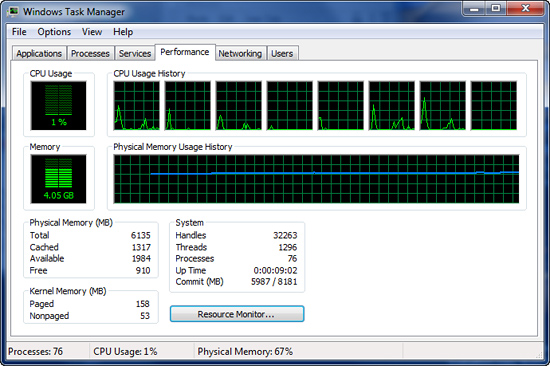
Before we start the benchmark process, our idle state memory usage is 4.05GB. Sa-weet!
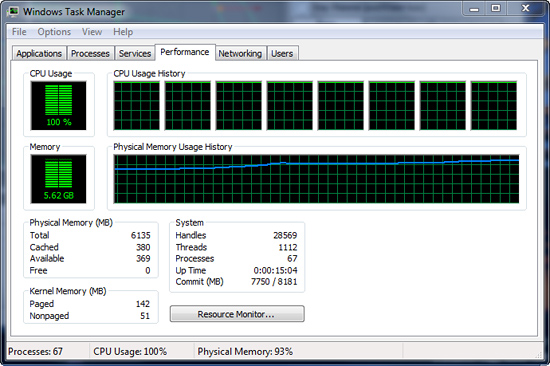
We wait two minutes for disk activity to cease and then start playing Pinball Wizard via iTunes, start the render scene process in Cinema 4D R11, start a resize of our Photoshop image, and finally the render frame benchmark in Lightwave 3D. Our maximum memory usage during the benchmark is 5.62GB with 100% CPU utilization across all eight threads.
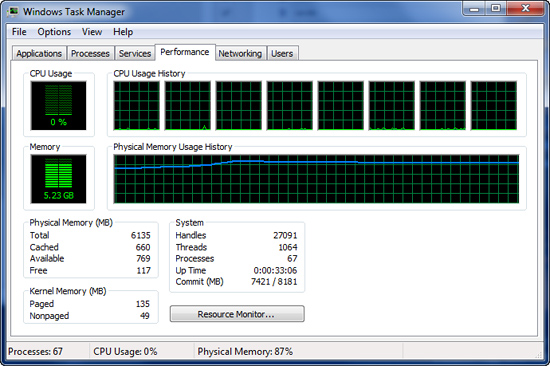
Our idle memory footprint after the benchmark has completed is 5.23GB. Trying to run our normal Photoshop benchmark at this point resulted in an out of memory error and automatic shutdown of Photoshop CS4 x64.
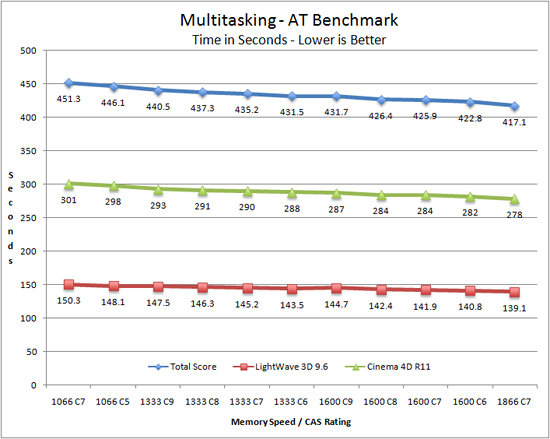
Our results follow an almost linear scale as we increase memory bandwidth in this benchmark. Improved latencies only matter when combined with increased memory bandwidth for the most part except for the DDR3-1333 C6 results just edging past the DDR3-1600 C9 score.
There is an 8% improvement in the total benchmark score when moving from DDR3-1066 C7 to DDR3-1866 C7. If you multitask with several memory intensive applications, at stock CPU speeds, increasing memory bandwidth is a simple way to improve performance.
Overclocked
Based on the above results at stock CPU speeds, we decided it would be interesting to look at what occurs when we overclock the system. We arrived at a 3.8GHz processor clock speed via the 19x200 setting. Essentially this is a free overclock as our CPU only needed an increase in VTT to 1.35V (board/processor dependent) to handle the increased memory loads at DDR3-1600 C6 and DDR3-2000 C8.
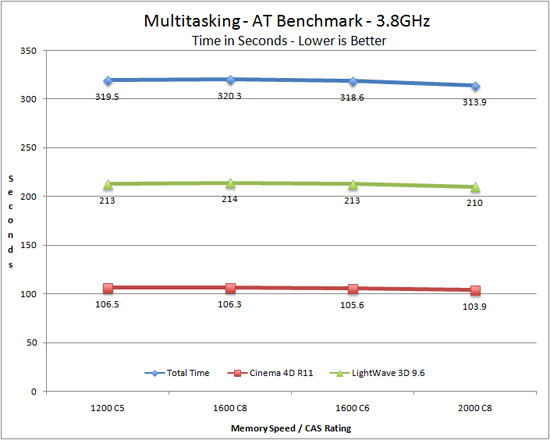
It is not until we hit DDR3-2000 C8 that our system responds favorably to increased memory bandwidth. Even then, the improvement is not as drastic as our stock numbers as going from DDR3-1200 C5 to DDR3-2000 C8 only improves performance by 2%.










47 Comments
View All Comments
darklight0tr - Wednesday, June 24, 2009 - link
You kinda lost me at the Windows 7 admission. Why use an unreleased OS that most of us don't have access to?Gary Key - Wednesday, June 24, 2009 - link
I debated about using Win7, but we have some interesting virtualization benches coming in a couple of weeks with XP mode running on it, both for these tests and looking at 12GB and 24GB loads.Also, memory management and several other performance metrics are just better under Win7 than Vista. I ran most of these tests under Vista 64 and the results (percentage wise) were the same as Win7. I also tried the latest RC version of Win7 (7232), no differences in performance. Not that I expected any as the core code for Win7 has been done for a while but it was to double check. I did not use 7232 since it is not "officially" available for the public. ;)
crimson117 - Wednesday, June 24, 2009 - link
http://www.microsoft.com/windows/windows-7/downloa...">http://www.microsoft.com/windows/windows-7/downloa...There, now everyone here has access to it.
darklight0tr - Wednesday, June 24, 2009 - link
LOL. You got me there, my brain hadn't arrived at work yet when I posted that comment.Still, I don't see the point of replacing the released, established OS with an unreleased one. Testing on both would have made more sense if you wanted to do it that way.
philosofa - Wednesday, June 24, 2009 - link
I lol'd :) Nicely done.Re the article itself; fantastic and thorough work as always! Great to see the debate and various titbits of benching replaced by such a systematic multi-app examination of i7 memory speed & latency effects. Also, cheers for the analysis of min frame rates - this is something that's been on-and-off for a while now, and I, like a lot of others, agree that it's as least as important as average FPS.
Cheers Gary.
Matt Campbell - Wednesday, June 24, 2009 - link
Great job as always Gary, fantastic detail.aileen - Friday, July 3, 2009 - link
Thanks for writing this. It was very helpful. Keep writing.http://www.freshsmileclinic.co.uk/dental-implants-...">http://www.freshsmileclinic.co.uk/dental-implants-...
http://www.freshsmileclinic.co.uk/dental-implant-d...">http://www.freshsmileclinic.co.uk/dental-implant-d...